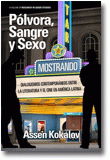
Pólvora, sangre y sexo
dialogismos contemporáneos entre la literatura y el cine en América Latina
By:
Assen Kokalov, Purdue University North Central
A volume in the series: Research in Queer Studies. Editor(s): Hidehiro Endo, Akita International University.
Published 2014
The book examines the links between literature and film in Latin America by using queer theory and a series of recent cultural productions whose arguments destabilize traditional gender roles and heteronormative masculinity. For many years, the connections between a literary text and its film adaptation have been considered only from the point of view of the latter’s fidelity to the written work, which many scholars imagined to be the original that filmmakers needed to respect. Within the last two decades, however, the idea of adaptation fidelity has been challenged by a number of critics who refute the existence of an original text and promote the notion of an ambiguous and complex relationship between a literary work and its film adaptation. Based on such developments and with the help of queer theory, this book questions and revises several crucial theoretical approximations that analyze the relations between the two art forms in an attempt to overcome the limitations of fidelity discourse. This is the first book-length study that seeks to examine, with the appropriate detail, the connections between film and literature in Latin America through the lenses of queer theory and by focusing on the representations of numerous practices that do not fit within the general framework of heteronormative sexuality.
CONTENTS
Agradecimientos. 1 Presentación. 2 Consideraciones adaptativas preliminares: Tres casos de dialogismo entre literatura y cine en Latinoamérica. 3 Fuera de la ley: Dialogismos homoeróticos en el ambiente del crimen y de la violencia urbana. 4 “Sim, meu sargento” o una exploración de la dictadura brasileña a través del dialogismo entre literatura y cine. 5 La desestabilización de la familia patriarcal latinoamericanay la adaptación cinematográfica. 6 Violencia, epidemia y homoerotismo: El dialogismo adaptativo tras el prisma del sida. 7 Conclusión. Bibliografía. Filmografía. Nota sobre el autor.
-
Paperback9781623966430
Web price: $45.04 (Reg. 52.99)
-
Hardcover9781623966447
Web price: $80.74 (Reg. 94.99)
- eBook9781623966454

- EDU000000 - EDUCATION: General
- EDU020000 - EDUCATION: Multicultural Education
- EDU037000 - EDUCATION: Research
-
 Exploring Gender and LGBTQ Issues in K-12 and Teacher Education
A Rainbow Assemblage
Exploring Gender and LGBTQ Issues in K-12 and Teacher Education
A Rainbow Assemblage
-
 Negotiating Spiritual Violence in the Queer Community
Negotiating Spiritual Violence in the Queer Community
-
 Queer Voices from the Locker Room
Queer Voices from the Locker Room
-
 Queering Classrooms
Personal Narratives and Educational Practices to Support LGBTQ Youth in Schools
Queering Classrooms
Personal Narratives and Educational Practices to Support LGBTQ Youth in Schools
-
 Queering Education in the Deep South
Queering Education in the Deep South
-
 Queering Public Health and Public Policy in the Deep South
Queering Public Health and Public Policy in the Deep South
-
 Queering Spirituality and Community in the Deep South
Queering Spirituality and Community in the Deep South

